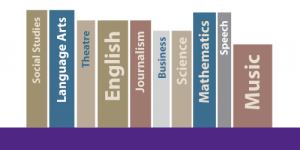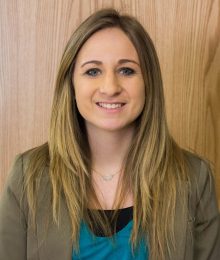 We asked some of your favorite Curriculum and Instruction professors, “What do you think is most enjoyable about teaching this age level/content area?” We think you’ll find their responses provide you with a few smiles…and some motivation to keep up your good work in the classroom.
We asked some of your favorite Curriculum and Instruction professors, “What do you think is most enjoyable about teaching this age level/content area?” We think you’ll find their responses provide you with a few smiles…and some motivation to keep up your good work in the classroom.
Dr. Brad Burenheide (Secondary Social Studies)— “Everything. The content, the kids, it is intellectually stimulating and enjoyable.”
Kaylee Myers (Elementary Education)— “The students, of course. They bring a smile to my face, especially each morning when they walk in ready to go and a new day has begun.
Cyndi Kuhn (Technology)— “I love technology, and there are so many options and always a new one. Embrace them.”
Dr. Sherri Martinie (Secondary Math)— “There are so many applications of the content to the real world. There are definitely opportunities to be creative teaching math. It is also very rewarding when students that have struggled with math start to make sense of things and enjoy learning the subject.”
Dr. Tonnie Martinez (Secondary Language Arts)— “I always loved when a student would say, “I hate English class.” I would tell them, ‘If you still don’t like it at the end of the semester, I’ll give you your money back!’ It broke the ice, and sometimes I was shocked when one of the “haters” came in during the last week of school and told me they didn’t want their money back and they liked English now.”
Dr. Tom Vontz (Social Studies)— “The honest and sometimes inaccurate and funny interpretations of the world that come from the mouths of little kids.”
Dr. Vicki Sherbert (Secondary English/Language Arts, Speech/Theatre, Journalism)— “We get to bring exciting literacy experiences to our students. Sharing our enthusiasm about books, authors, poetry, drama, etc. with our students is critical to help them develop their own literate lives.”
Dr. Sally Yahnke (Family and Consumer Sciences)— “I think the most enjoyable part of family and consumer sciences is the fact that the content really allows you to get to know your students, not only in class but through FCCLA. Class content is relevant to the students for the decisions they are making today and the decisions they will be making in the future.”
Dr. Phillip Payne (Music Education)— “The most enjoyable part for me is to see students developing their love and knowledge of music. They learn to take ownership of their musicality and to see that is immensely gratifying.”


 She also credits KSU with getting her ready for the classroom.
She also credits KSU with getting her ready for the classroom.


